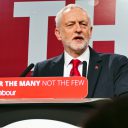“They didn’t tell us we could do that”: on Mayism and the economics of nationalism

By John Pannell – Flickr: DSC_0353, CC BY 2.0.
First as tragedy
Between 1929 and 1931, a minority Labour government tore itself to shreds in a desperate attempt to keep Britain in the Gold Standard international monetary system. Winston Churchill – then Chancellor of the Exchequer – re-established Sterling at the centre of a revived Gold Standard in 1925, revaluing it at pre-war levels despite the devastation which the First World War had inflicted on the British economy. Labour, seeking to reform rather than overthrow British capitalism, offered little in the way of an alternative. Within the party’s social democratic orthodoxy, the stability of the international economic architecture and high finance had to be secured before Labour could focus on its own supporters amongst the industrial working class. Industrial areas experienced great hardship as Britain struggled on maintaining relatively liberalised trade and a highly uncompetitive currency valuation. The fiscal situation was also hindered, and the Labour government ultimately fell due to an internal feud over further cuts to unemployment benefit. Yet the rules of the game were dramatically changed just days and weeks after this collapse. The incoming (largely Tory) National Government took Britain off the hallowed Gold Standard, raised tariffs, subsidised industry and set about arranging preferential Commonwealth trading. Sidney Webb, the leading Fabian intellectual who had served as the Secretary of State for Dominions and Colonies in the Labour administration, responded to the situation with the exasperated cry of: “they didn’t tell us we could do that!”
Ed Miliband’s response to Theresa May’s first Tory conference speech as prime minister was a Webb-like gasp of surprise, albeit in postmodern (tweeted, darkly ironic) form. Having battled to position the Labour party as the face of moderate, happy austerity – wielding a friendly axe, in Peter Brookes’ memorable depiction – Miliband watched a Tory government boldly endorse the kind of state intervention and delayed cuts that had characterised his central economic policies. Furthermore, the Tories are flirting with the economically perilous prospect of ‘hard Brexit’, and appear prepared to force big business to shoulder a substantial share of the costs. The effects of the uncertainty and costs associated with the falling value of sterling were summarised in the recent ‘Marmitegate’ standoff between Tesco and Unilever. It seems unthinkable that a ‘responsible’ Labour government would have tolerated (or have been allowed to tolerate) the dangers to business as usual that May’s government is presently overseeing as part of its ‘duty’ to represent the will of the British people.
For those who have spent the last near-decade portraying the Tories as unswervingly pro-business, or for those who have insisted on the impossibility of any alternative economic approach to unbridled ‘neoliberalism’, recent developments have come as a shock. Contrary to the deterministic readings of Britain’s financialised political economy, popular anomie has shaken the social foundations of the country between 2014 and 2016. Under May this has achieved a recognition at the highest levels of the state, as the relationship between government, economy and ‘society’ shifts from one of growing marketisation towards a new, more muscular role for the state. Left-wingers enthralled by Mariana Mazzucatto’s ‘Entrepreneurial State’ thesis – that states play a central role in creating and harnessing markets – have been left cowering or confused at the prospect of its enthusiastic embrace by the right: suddenly, the big state doesn’t seem so friendly after all.
This poses several questions. How have the right, yet again, positioned themselves at the forefront of a wave of political-economic change? What are the forces driving this right-wing reformation, given the clear lack of enthusiasm from business? Most importantly: will it work? And finally, what can the left do, now that key distinguishing features of its economic programme have been so forcefully appropriated?
Embedded capitalism and ‘buying time’
One of the most famous analyses of the Gold Standard’s collapse is Karl Polanyi’s The Great Transformation, published in 1944 as the finishing touches were being applied to the new post-World War Two international economic system. Polanyi argued that the Gold Standard followed a utopian logic unique in human history: the advocates of “market society” wanted to subordinate the social and non-economic character of human relations to the rational, inhuman force of markets. They did so by mobilising the repressive forces of the centralised state within England before the British Empire’s combination of trade, high finance and gunboat diplomacy spread the logic of the ‘invisible hand’ round the globe during the nineteenth century. The result, in Polanyi’s diagnosis, was the violent reassertion of “society” in the form of world war, Bolshevism and fascism. Coalitions of social interests sought various alliances against the transformation of their lives and livelihoods into the “fictitious commodities” of land, labour and money. Despite the turmoil of the first half of the twentieth century, Polanyi was optimistic that these ‘counter-movement’ coalitions would be able to restate the primacy of society in a progressive, humane way – and he appeared vindicated by the triumph of the “social state” across the industrial world from 1945. Polanyi’s most influential contribution is the concept of “embeddedness”, the idea that the economy is always actually subordinate to social relations. The negative side of this is his critique of “disembedding,” the utopian project to elevate and rationalise the economy above social influence.
Polanyi’s most pronounced theoretical advocate in modern political economy is Wolfgang Streeck, who has described the embedded post-war consensus as a system of “democratic capitalism”. Streeck’s synopsis of the Eurozone crisis, Buying Time, argues that this democratic embedding of capitalism was always fragile and crisis-prone. Since the erosion of national social democratic structures in the late 1960s, European governments have been applying increasingly threadbare bandages to the growing disconnect between the economic and social functions of the state. As wages fail to keep up with profits and the fiscal basis for universal public services crumbles, ruling classes have sought various means of avoiding the reassertion of democratic demands for a social state. High finance and industrialists have spent decades attempting to disentangle their economic interests from national democracies by constructing increasingly inter-connected and financialised forms of capital accumulation. The European single market and its stringent restrictions on national autonomy in economic policy-making are among their key achievements. These systems are opaque, unaccountable and undemocratic. Their political correlate is the double-edged sword of a nominally apolitical and detached class of technocrats locked in a growing struggle with an inchoate and ever-more furious set of populisms.
In this context, the structural causes and indeed potential function of Brexit becomes reasonably clear; and it also makes the appeal or a “hard” Brexit over its “soft” alternative more apparent. It is an attempt to “take back control”, not only in terms of laws and state functions taken back from Brussels, but also to reassert the embeddedness of market forces in some kind of integrated social whole. Theresa May’s surprising boldness over the extent of Britain’s disentanglement from the European Union comes from a recognition that British society is basically falling apart. Her willingness to terrify business, her apparent tolerance of a plummeting pound, and her nonchalant attitude to the economic impact of measures such as proposed migration restrictions, represent a fundamental divergence from the immediate economic interests of business. Years in the Home Office, Britain’s most paranoid and apocalyptic government department, have prepared her for a very specific and rarely visible state function: maintaining social order, perhaps the only task that can possibly take priority over private profits. May is imposing the will of political power on an economic system which has come to expect its every demand to be met, and for the social consequences to be borne by the worse-off.
The significance of this transition has not yet been fully comprehended. In the chief organ of business opinion, the Financial Times, leading economic commentator Martin Wolf recently condemned May’s use of “unwise words” and “loose talk”, which have had material consequences for the stock markets and the value of the pound. Wolf correctly points out the clear limits to sovereignty imposed upon Britain by its participation in a liberalised economy and its reliance on global finance capital. However, he fails to realise the power which the idea of sovereignty retains or even gains in these circumstances. The gap between the economic realities of market forces and the political aspiration for social embeddedness can only be stretched so far before it springs back.
Social Nationalism
One necessary conclusion from this is that the British left must begin to take nationalism much more seriously. It is categorically not a simple case of “false consciousness”, a form of glorified propaganda with which the rich keep everyone else in line. Nor is it a form of social solidarity that can be stabilised within some kind of progressive consensus, as certain left-wing intellectuals in Scotland and England have been suggesting. Nationalism is the product of a particular antagonism, between the objective structures of the state as a means of keeping order, and the ways in which that order is subjectively experienced by the people who live under it. In whatever passes for “normal” times, the state’s usual function – greasing the wheels of capitalism – leads inexorably towards the kind of utopian, disembedding economic policies that suit the immediate interests of capital. ‘Neoliberalism’ was one such programme. Such a movement, however, kickstarts the counter-movement, which reasserts some sort of social interest within the prevailing political-economic framework. Given that the experience of capitalism, be it through labour or leisure, occurs through a primarily national lens across most of the world, the counter-movement tends to make its demands within a national frame. But sometimes, depending on the particular circumstances, an alternative form of identity is more salient: resistance may be organised along sub-national or sub-cultural lines. The point is to re-establish some sort of legitimate community in which economic processes can continue.
Theresa May, the quiet Remainer, recognises that it is a social will rather than a clear economic interest which asserted itself so catastrophically with Brexit. She is now seeking to ensure that this interest forms the basis for the British state’s legitimacy as it deals with the ensuing crisis. May is trying to synchronise the “official” top-down form of nationality that underpins British state legitimacy with the more elemental national identity of that state’s frustrated subjects. Hers is a form of popular nationalism, drawn from a xenophobic and overwhelmingly English folk politics of a variety clearly distinct from Cameron and Osborne’s aristocratic idiom. The Eton set ran the country with all the empathy and understanding of an absentee landlord; the relentless pursuit of balanced budgets, the grasping emptiness of the “big society” and the gormless idiocy of holding the EU referendum in the first place betrayed a fundamental ignorance of the people whose lives they toyed with. Thus far, May appears rather more clued-up.
Britain has recently been shaken by two major episodes of populist upheaval. Both the Scottish independence referendum and the EU referendum were plebiscites where nominally non-party campaigns claimed to assert the social aspirations of the maligned majority against the status quo. Both referendums were extraordinary events that communicated the dissonance between Westminster politics and popular feeling. Campaigns which styled themselves as insurgent spoke against predominating economic interests of distant elites, be they based in Brussels, Westminster or the City of London. They prompted hundreds of thousands and sometimes millions of people to reject the economic “reason” of a faceless expert caste and opt for the warm, hearty distinctiveness of rogue individuals. Binary choices combined with populist mobilisation led to a rare moment of profound political realignment, forced onto a hitherto nimble elite by a stranger, cruder Machiavellianism of mass anger.
These commonalities should not be allowed to obscure the differences between Scottish ‘civic’ nationalism and May’s emergent pronounced British nationalism, which are evident at even a superficial glance. In terms of their institutional bases, their cultural character and their ideological positioning, these efforts to re-hegemonise politics are an ocean apart. This is, indeed, part of their power; they can be played off against each other, as May seeks to reunify a fragmented British society while Sturgeon gleefully distinguishes herself from the new Thatcher in the South. However, both cases can be viewed as attempts to re-embed increasingly destabilising market forces within a general cultural and ethical consensus. Both can perhaps be characterised as “social nationalism”, a term used by Gallagher, Scothorne and Westwell to describe Scotland’s new politics in their book Roch Winds: A Treacherous Guide to the State of Scotland. In both cases, the ideal of citizenship serves a particularly prominent role. In Scotland, this comes in the form of a doctrine of rights and social responsibilities and a notion of an economic life governed by the collectivist interests of social partners. Thanks to a long tradition of “administrative devolution” in the country, Scotland has a dual official nationality, and as a result the gap between official nationality and popular feeling never reached the chasm communicated by Brexit. Scottishness has done the heavy lifting of legitimisation when Britishness has failed, and the SNP have shifted comfortably from claiming the mantle of insurgent nationalism-from-below to becoming advocates of a comforting nationalism-from-above. The recent realignment in Scotland must be viewed as a process of legitimating the same basic form of politics – managerial, parliamentary, and comfortable with big business – as that which led to the Brexit result in the rest of the UK.
While the SNP and the Conservatives clearly stand on different parts of the political spectrum, and indeed represent rather different parts of their respective polities, the SNP are by no means a radical break from Westminster politics. Blairism, as Ken McLeod observed after the independence referendum, has arrived in Scotland belatedly but at the head of a popular movement New Labour could only have dreamed of. That movement is now being swallowed by a highly professionalised party machine. At the SNP’s recent conference, Tommy Sheppard ran against Angus Robertson for the party’s deputy leadership on a platform of democratising the party and engaging its enormous membership in campaigns and policy to an unprecedented extent. Robertson, who has led the party’s lurch to the right on foreign policy in recent years and offered little in the way of members’ engagement, flattened the Sheppard insurgency with 52% to the latter’s 25% on the first round of voting. Robertson was widely believed to be the leadership’s favoured candidate, urged to stand when Sheppard began gathering support. In policy terms the party is increasingly committed to hiding difficult political-economic decisions beneath a veil of technocratic “consultation” and expert advisory groups. The SNP’s recent announcement of a “growth commission” was met with barely a mumble of dissent, despite the fact that the commission was made up entirely of business owners, liberal economists and SNP politicians – not a trade unionist or environmentalist in sight.
Meanwhile, May-ism’s contours are just becoming apparent. A premium is placed on (re)constructing a sense of social cohesion. This necessarily entails giving heightened political recognition to those seen to maintain the social fabric of British society – either positively, by favouring them with policy, or negatively, by punishing those seen to be outside such a constituency. Such a vision is, of course, inherently racialised and exclusive. May’s brazen rejection of the globally minded as “a citizen of nowhere”, and her attack on “left-wing human rights lawyers harassing UK troops”, should not be read as occasional excesses or mere fodder for the Daily Mail. They contain the kernels of an outlook which redefines worth, value and belonging. Those who were until recently characteristically (even tokenistically) welcomed, such as patriotic skilled migrants, are newly suspect; not even foreign-born doctors are safe. Elements of loyalty and lineage thus merge in a redefined conception of fairness which rejects characteristic ‘neoliberal’ definitions of economic utility.
They say immigrants steal the hubcaps
Of the respected gentlemen
They say it would be wine an’ roses
If England were for Englishmen again
– The Clash, Something about England
Mayism has found itself tiptoeing across the faultlines of popular Englishness and official Britishness. While the new England has as its animating force the cultural and social project of an ever-harder Brexit, the old and faltering Britain remains above all else a vehicle for the accumulation and protection of capital at home and abroad. These two identities, once snugly intertwined, now frame a yawning, perilous void. Unlike Scottish nationalism, Englishness lacks institutionalisation or a clear place within a hegemonic political project. It has largely been defined as a subaltern identity asserted in opposition to elements of Britishness, especially in the latter’s cosmopolitan and metropolitan forms, but without a clear alternative. Elements of a distinctly English identity have occasionally been mobilised by Conservative politicians within broader attempts at giving economic upheavals a social and cultural facelift. Thatcherism’s attempt to find a social base for the property owning democracy was the most successful of these. Yet Mayism does not attempt to provide a social basis for an expansive era of capital accumulation. May is articulating a response to the chasm between economy and society that neoliberalism wrought, and imposing the political requirements of order at the expense of immediate economic interests of capital.
The Great Disintegration
It won’t work. May’s project will flounder. It cannot deliver the communitarian goals it strives for, and will damage Britain’s competitive position. The falling value of sterling will not provide the same benefits it did during the 1930s. Deindustrialisation and the continued reliance on international investment rule out an inwards-turning inflationary economic boom and there is no option for an imperial trading bloc, despite the fantasies of some Tories. Consumers will have to pay more for imported goods under conditions of prolonged stagnation. Any renewed emphasis on “Englishness” from the left or right, explicit or implicit, will find itself desperately looking around in vain for any substantial historic institutional basis. Opportunistic reformers will issue ever louder calls for an English parliament and further metropolitan and regional devolution, but without being part of an economic programme that can plausibly offer rising living standards and greater personal autonomy, constitutional change is a technocratic pipe-dream. And while Englishness stays lost in the clouds, Britannia will keep calm and carry on sinking beneath the waves. The Union will continue to flounder in a polarised climate but Scotland’s future is just as likely to be deferred; a cold war over independence will sustain a sabre-rattling SNP hegemony for some time yet. For Walter Benjamin, the true catastrophe was that “things keep going on like this.” In Scotland, things will keep going catastrophically nowhere.
The all-pervasive polarisation of British society, culture and politics can only intensify. Perhaps the greatest delusion to have gripped almost all participants in whatever passes for a British public sphere is that there is still hope for some major, unifying political project across the country. Corbyn’s election and the emergence of Labour as the largest party in Europe is a major event of huge historical importance, but it will not sweep to power on the back of some new UK-wide socialist consensus; it will on the contrary help to accelerate the long fragmentation of British politics into warring and mutually incompatible subcultures. Urban Britain, and especially its politically active and engaged sections, reject May’s program entirely. The culture war elements of Brexit, visible in the ‘48%’ as well as the ‘52%’, are bolstered by an essentially social democratic sensibility among city dwellers struggling in property and labour markets, with sympathy for welfare states and the public sector. There are further conflicts within these groups, for instance the emerging gulf in generational priorities even within the Corbynista echo chamber.
But this fragmentary political world cannot possibly be reflected in Westminster’s mirror. Electoral politics across the world has always sought unity, a “fictive unity” in Perry Anderson’s terms, which keeps the real sources of disintegration out of sight and mind thanks to the superficial juridical equality of the ballot. An effective political response to Brexit, and to Mayism, and indeed to any of the crises bearing down on this tiny island, must not only embrace fragmentation but actively pursue it; not in the constitutional sense, where some kind of British or Scottish national unity is the end goal, but in a social sense. There are enemies at home as well as abroad, and they already have the control which Brexit and Mayism promise to “take back”. Their power exists comfortably outside of parliament’s reach, no matter how sovereign that parliament purports to be. It has to be taken back in other realms – in the workplace and on the streets, the sites of conflict that go untouched by the consensual dynamic of parliamentarism. It is there that capital and the state exercise their real power, be it through police violence, starvation-level price rises, “market forces” sackings or simple asset stripping. When the true catastrophe of Brexit becomes all too clear, capital and the state will eventually secure order or profit through direct, unparliamentary coercion – they didn’t tell us we could do that.






